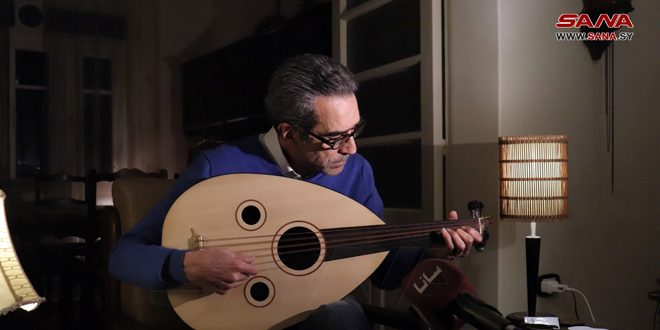Aleppo-SANA
His upbringing in a house of Aleppo art and music motivated him to learn music, specifically on the oud instrument, which made him a “player and maker” of this ancient instrument..Bashar Hassan, who excelled with his musical compositions and mixed with his oud brush between the different artistic schools that he was influenced by and uniquely composed his own melodies that led him to fame and playing With the flags of art and authentic Aleppo music.
Bashar Hassan said in an interview with SANA: The oud is a very old instrument, and it is one of the stringed instruments that changed its shape during the time periods it went through, and strings were added to it until it reached its current form, “six strings.” This instrument witnessed a great development in the style of playing according to the time climate and shape. Music.
And he indicated that the importance of adding a string does not lie in increasing the number of strings of the oud, but rather how to employ this string properly and in the best way to serve the music, as the most skilled musicians still use only four strings.
Hassan emphasized that the importance of the oud, especially in the eastern takht, which also includes the qanun, flute and raq, lies in the musical weight, as the style of playing the oud instrument changed with the introduction of the so-called bass instruments “contrabass and cello”, which began to take the place of the oud as a function and which give thick sounds whose mission is musical weight. The players resorted to changing the style of playing, and another fifth and sixth strings were added, and we also witnessed a change in the style of the recorded oud that reached us in 1925, as we used to hear the oud in musical weight with the accompaniment of the singer and improvised divisions.
After that, Hassan explained that schools of playing the oud began to appear, including the Syrian one, which was represented by the Emir of Al-Bazouq, the oud player Muhammad Abd Al-Karim, and the Iraqi, Persian, Turkish, and others. Nadim Al-Darwish, Dr. Muhammad Qadri Dalal, Al-Naqshbandi Al-Shami, Munir Bashir, and these musicians whose musical creativity was beyond the traditional style.
And Hassan indicated that despite the emergence of these schools, he was influenced, as he put it, by the giant of playing, Muhammad Abdel Karim, who played the oud and the bouzouki in a unique manner that did not obey the rules of playing, and he is a genius composer, pointing out that the oud is an open instrument and its trigger is open that is not determined by anything like the guitar that can be played on it. Western and eastern melodies and pour all your imagination into it.
He pointed out that in 1980 he joined with his brother the ancient Al-Urouba Youth Club in Aleppo, which included many artists, playwrights and singers. He mixes and plays the oud and the buzuq, and sings his own songs that the audience of listeners introduced him to.
Then Bashar Hassan moved to musical composition away from repetition, because music is an expression of an emotional state that comes out of the heart with a musical phrase that has been going on for more than a hundred years, and he worked to change his playing style in line with advancing age. Through him, he learned about Syriac music, which is considered the mother of music in the Levant region.
The distinguished musician, Bashar Hassan, played with great artists, including Sabah Fakhri, Suad Muhammad, Nihad Najjar, Omar Sarmini, Shadi Jamil, and currently with Hammam Khairi. He participated in several festivals, the most important of which was the First Oud Forum in Cairo 2006, and musical evenings in a number of Syrian governorates and in European and American countries during his tours with the artist Sabah. honorary.
At the end of his speech, he stressed the importance of supporting music in Syria, from which the oldest musical note of the world came out and in which music was recorded, indicating the importance of the religious corners that he learned about during his musical journey, including the Rifa’iyyah, the Hilaliyya, the Naqshbandiyya and the Padinjik, which are an extension of the spirit of music that Aleppo witnessed.
Qusai Razzouk
Follow SANA's news on Telegram https://t.me/SyrianArabNewsAgency

